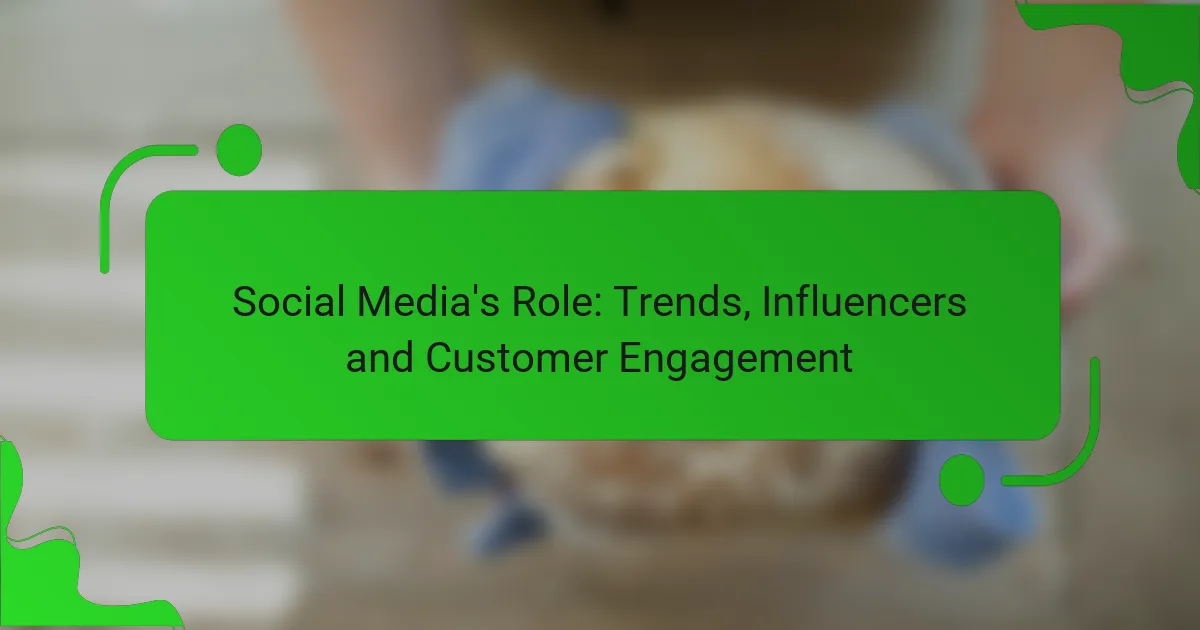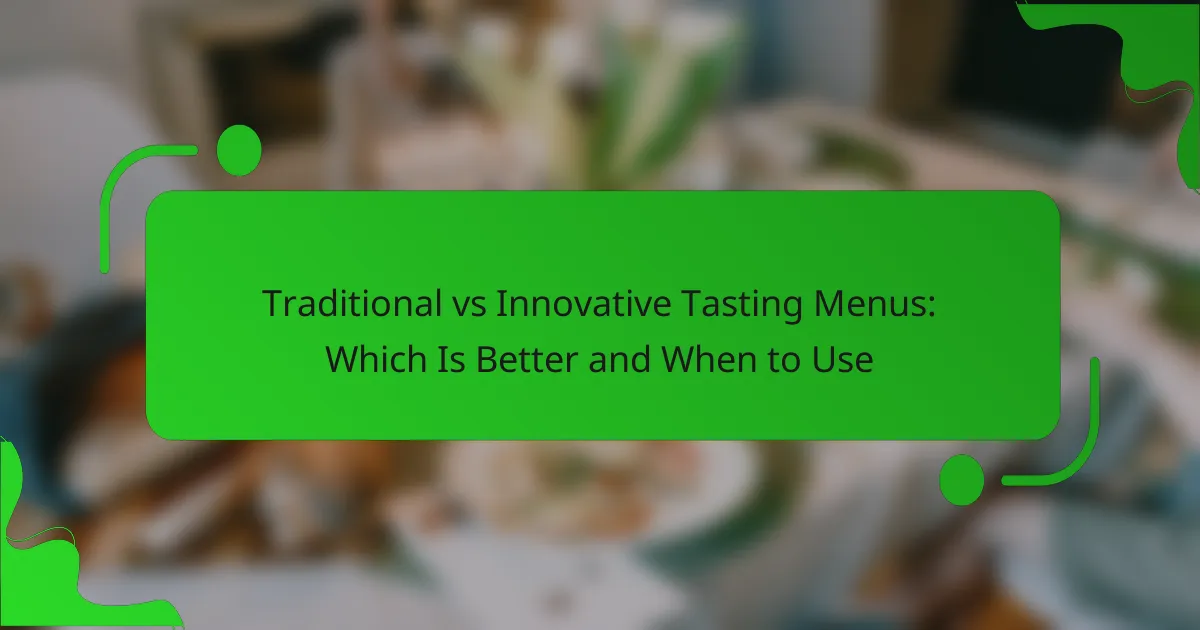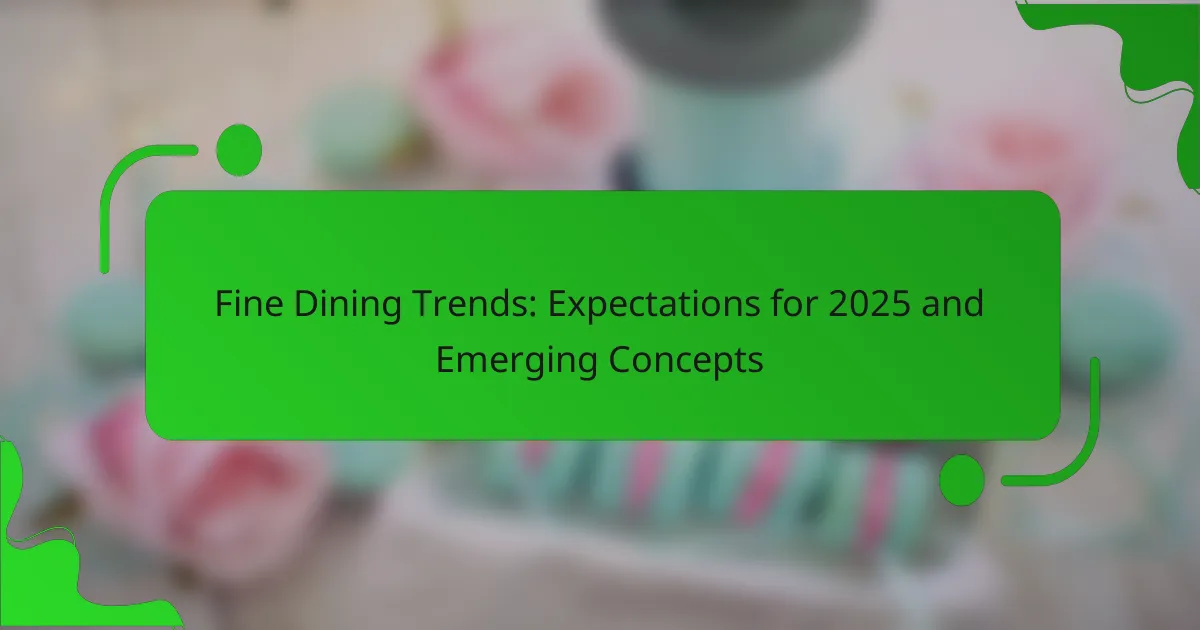Social media is revolutionizing customer engagement by enabling brands to establish direct and personal connections with their audiences. In Los Angeles, businesses are harnessing current trends such as innovative content, influencer partnerships, and community interaction to enhance customer experience and foster brand loyalty.
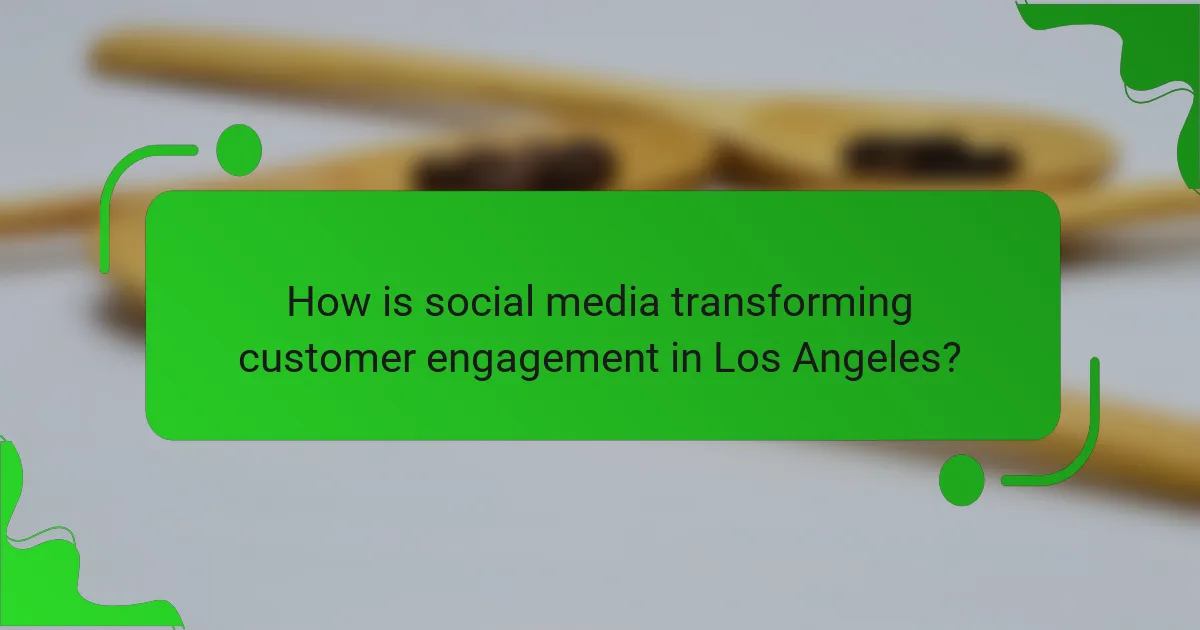
How is social media transforming customer engagement in Los Angeles?
Social media is reshaping customer engagement in Los Angeles by fostering direct connections between brands and consumers. This transformation allows businesses to interact more personally and responsively with their audience, enhancing overall customer experience.
Increased direct interaction
Social media platforms enable brands to engage directly with customers through comments, messages, and live chats. This immediacy helps businesses address inquiries and concerns swiftly, creating a more personal touch that resonates with consumers.
For example, a local restaurant in Los Angeles might use Instagram to respond to customer reviews or questions about menu items, fostering a sense of community and connection. This direct interaction can lead to increased customer satisfaction and loyalty.
Real-time feedback mechanisms
Social media provides businesses with real-time feedback from customers, allowing them to gauge reactions to products or services almost instantly. This immediate insight helps brands adjust their strategies and offerings based on customer preferences.
For instance, a fashion retailer could post a new clothing line on Facebook and quickly assess customer reactions through likes and comments. This feedback loop can inform future designs and marketing efforts, ensuring they align with consumer desires.
Enhanced brand loyalty
Engaging with customers on social media can significantly enhance brand loyalty. When brands actively communicate and respond to their audience, they build trust and a sense of belonging among consumers.
In Los Angeles, brands that share user-generated content or highlight customer stories can strengthen these connections. For example, a local coffee shop might feature customers enjoying their drinks, creating a community feel that encourages repeat visits and long-term loyalty.
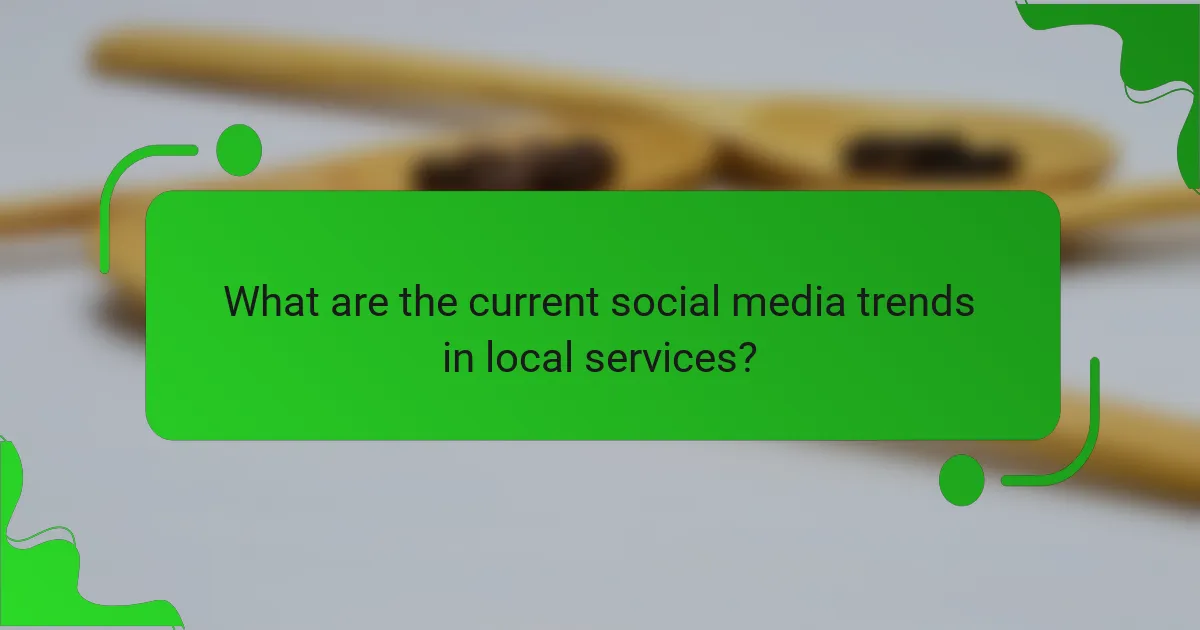
What are the current social media trends in local services?
Current social media trends in local services focus on engaging customers through innovative content and community interaction. Businesses are increasingly leveraging video, influencer partnerships, and local community building to enhance customer engagement and brand loyalty.
Rise of video content
Video content is becoming a dominant form of communication on social media, particularly for local services. Short, engaging videos can showcase products, services, or customer testimonials, making them more relatable and shareable.
Platforms like Instagram and TikTok prioritize video, so businesses should consider creating content that is visually appealing and concise. Aim for videos that are under a minute to capture attention quickly and encourage shares.
Influencer partnerships
Collaborating with local influencers can significantly boost visibility for local services. Influencers have established trust with their followers, making their endorsements more impactful than traditional advertising.
When selecting influencers, consider their audience demographics and engagement rates. Micro-influencers, with smaller but highly engaged followings, can often provide better ROI compared to larger influencers.
Local community building
Building a local community on social media fosters loyalty and encourages word-of-mouth referrals. Engaging with local customers through events, promotions, or user-generated content can strengthen community ties.
Consider hosting local contests or featuring customer stories to create a sense of belonging. Regularly interacting with followers by responding to comments and messages also enhances community engagement.

How do influencers impact social media marketing?
Influencers significantly shape social media marketing by leveraging their credibility and follower relationships to promote brands. Their ability to connect authentically with audiences enhances brand visibility and trust, making them valuable assets in marketing strategies.
Authenticity and trust
Influencers build strong relationships with their followers based on authenticity, which translates into trust. When influencers endorse a product, their audience is more likely to perceive it as a genuine recommendation rather than a mere advertisement. This trust can lead to higher engagement rates and conversions.
Brands should choose influencers whose values align with their own to maintain this authenticity. Misalignment can lead to skepticism and damage both the influencer’s and the brand’s reputation.
Targeted audience reach
Influencers often have niche audiences, allowing brands to reach specific demographics effectively. This targeted approach can be more efficient than traditional advertising, as it connects products with consumers who are already interested in similar content.
To maximize reach, brands should analyze the influencer’s audience demographics, engagement rates, and content style. This ensures that the partnership resonates with the intended market, enhancing the likelihood of successful campaigns.
Content creation collaboration
Collaborating with influencers on content creation can yield innovative marketing materials that resonate with audiences. Influencers understand their followers’ preferences and can create authentic content that showcases a brand in a relatable way.
Brands should encourage influencers to use their unique voice and style in campaigns. This not only fosters creativity but also ensures the content feels organic, which is crucial for maintaining audience engagement and interest.
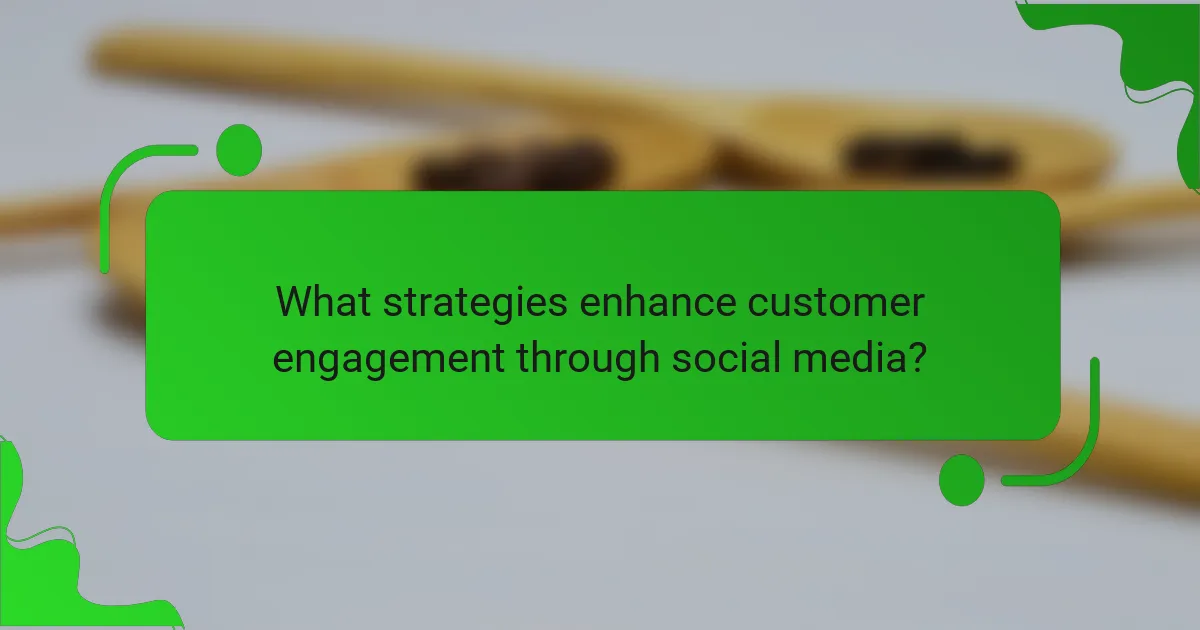
What strategies enhance customer engagement through social media?
Effective strategies for enhancing customer engagement through social media include personalized content delivery, leveraging user-generated content, and organizing contests and giveaways. These approaches foster deeper connections with audiences and encourage active participation.
Personalized content delivery
Personalized content delivery involves tailoring messages and offers to individual users based on their preferences, behaviors, and demographics. This strategy can significantly boost engagement by making customers feel valued and understood.
To implement personalized content, brands can utilize data analytics to segment their audience and create targeted campaigns. For instance, sending customized product recommendations based on past purchases can lead to higher interaction rates.
Utilizing user-generated content
User-generated content (UGC) refers to any form of content created by customers, such as reviews, photos, or videos, that showcases a brand. Incorporating UGC into marketing strategies can enhance authenticity and trust, as potential customers often relate more to peer-generated content than to brand messaging.
Brands can encourage UGC by creating specific hashtags or running campaigns that invite customers to share their experiences. For example, a clothing brand might ask customers to post photos wearing their outfits, which can then be featured on the brand’s social media channels.
Engagement through contests and giveaways
Contests and giveaways are effective tools for driving engagement on social media platforms. These activities not only incentivize participation but also increase visibility as users share the contests with their networks.
To run successful contests, brands should clearly outline the rules, offer appealing prizes, and promote the event across their social media channels. A common approach is to require participants to like, share, or comment on a post to enter, which can significantly expand the brand’s reach.

What metrics measure social media success for local businesses?
Local businesses can measure social media success through various metrics that reflect engagement, conversion, and overall impact. Key metrics include engagement rates and conversion tracking, which provide insights into how well social media efforts resonate with the target audience.
Engagement rates
Engagement rates indicate how actively users interact with a business’s social media content. This includes likes, shares, comments, and overall reach. A higher engagement rate often suggests that the content is resonating well with the audience.
To calculate engagement rates, divide the total interactions by the total followers and multiply by 100 to get a percentage. For local businesses, aiming for engagement rates between 1% to 5% is generally considered effective, depending on the platform.
Common pitfalls include focusing solely on follower count rather than the quality of interactions. Regularly analyzing which posts generate the most engagement can help refine content strategies.
Conversion tracking
Conversion tracking measures how many social media interactions lead to desired actions, such as purchases or sign-ups. This metric is crucial for understanding the return on investment (ROI) of social media campaigns.
To effectively track conversions, businesses can use tools like Google Analytics or Facebook Pixel, which allow for monitoring user behavior after they click on social media links. Setting clear goals, such as increasing website traffic or boosting sales, helps in evaluating the success of campaigns.
Local businesses should ensure that their conversion tracking aligns with specific objectives, such as local promotions or events. Avoiding overly complex tracking setups can help maintain clarity and focus on key performance indicators.
